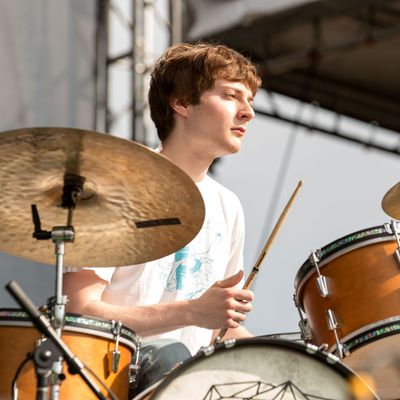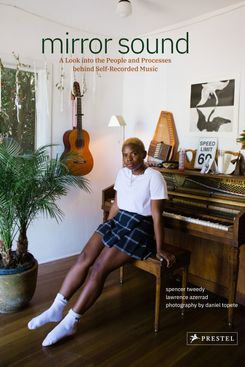
Productivity is in the Tweedy genes. Look at Jeff, longtime leader of the quintessential indie-rock band Wilco, who just released a new book, How to Write One Song, will release his new album, Love Is the King, out October 23, and has performed over 100 episodes and counting of his family’s Instagram concert series, The Tweedy Show — and he’s done it all during a pandemic. Then look at his 24-year-old son, Spencer, who’s done all of the same: He drummed on Love Is the King and joined his family for The Tweedy Show, and, not to be outdone by his dad, will release his own book, Mirror Sound: A Look Into the People and Processes Behind Self-Recorded Music, on October 20. (While you’re at it, don’t count out Spencer’s younger brother Sammy, who also performs with him and their father on The Tweedy Show and Love Is the King.)
Writing isn’t new to Spencer, who contributed to his friend Tavi Gevinson’s now-shuttered magazine Rookie in the early ’10s, writes a daily blog called “Observations,” and writes music under his own name, too, most recently the 2019 EP Sleep Is My God. Still, he calls writing a book “scary as hell,” adding that the biggest thing he’d previously written were some college papers (he graduated from Wisconsin’s Lawrence University in 2019). When he pitched the project, he set out to show home recording as a world of accessible possibilities, pushing back against the air of exclusivity music recording can often have. So he interviewed musicians who self-record — from others in the Chicago scene like NNAMDÏ and Open Mike Eagle to indie-rock giants like Mac DeMarco, Sharon Van Etten, and Ty Segall. It was “a ridiculous privilege,” he said, to interview some of the practice’s elders, like New Age pioneer Suzanne Ciani and late pop-rock icon Emitt Rhodes.
He’s adamant that the book isn’t a technical how-to guide, but an exploration of creativity; Sleater-Kinney’s Carrie Brownstein writes in the foreword, “This book is also about a fundamental reimagining of ourselves and the spaces in which we create and invent.” As such, it’s an equally fruitful read for music fans as it is for music-makers, also thanks in part to the stunning, intimate photographs of the subjects at their home studios, shot by Daniel Topete and laid out by Lawrence Azerrad, longtime designer for Wilco. Vulture spoke to Spencer Tweedy about Mirror Sound, working on his dad’s new album, and creativity during quarantine.
Why home recording?
In high school I started figuring out that it was possible to engineer records at home. I had known about the possibilities of recording with GarageBand or Audacity, but I learned that all of the things that seemed really, really out of reach were actually not so intimidating, things like microphone preamplifiers and compressors. It opened up a huge world to me. I think there’s a lot of abstract, hand-wavy stuff involved with recording music, and it can build up a mythology around the way records are made.
As someone who makes music yourself, what were some of the biggest things that you learned from talking to other people about how they record?
Ty Segall talked about composing with rhythms first. My main instrument is drums, so I had thought a little bit about composing with rhythm before, but not to the extent that Ty talked about. He improvises drumbeats for however many minutes, and then uses the contours of that recording to inspire all the guitar and synthesizer parts that go on top of that. That was really shocking to me, ‘cause even though drums are my main instrument, I had just assumed the orthodoxy of, you’ve got to compose on a chromatic instrument like guitar or piano. Other than that, I think the things I learned were a little less concrete. It was cool to see everybody’s way of motivating themselves, as people who work largely in solitude.
That ended up being one of my favorite parts about the book: getting to read everyone just talking about how to be a creative person and push yourself to make things.
I think things can get really exclusive and you can fall into those mythologizing traps really easy when things become so much about the material circumstances of making the record and not as much about the creative parts or the stuff that anybody can access.
Going down that road for just a second though, I was curious whose setup you were the most jealous of for yourself.
I think there’s something nice about having a little bit of a physical separation from your living space and where you do your work. Merrill Garbus and Nate Brenner of Tune-Yards talked about that at length: why their studio is a couple blocks away from where they live, so that they can enforce just a little bit of mental separation between them. But another one that I really love is Melina Duterte of Jay Som’s studio, because she has a fully built up mixing suite, basically, in her bedroom. It doesn’t get more comfortable than that, when you can roll out of bed and go straight to the thing that you’re dying to work on.
Your dad has this other book that just came out, How to Write One Song. Were you comparing notes as you were working?
Surprisingly, no — they happened pretty much totally independent of each other. I think it was just a bizarre coincidence that we both ended up working on these things and they are kind of complementary to each other, because Mirror Sound doesn’t have that much to say about songwriting, and likewise, How to Write One Song pretty much stays away from recording music. I’m happy about the way they fit in with each other like that.
I’m excited to hear this album that you worked on with him as well, Love Is the King. What was that process like?
We started working on it early on in stay-at-home orders. I can’t say it was that much different from the process that’s sort of become normal for us over the past [few] years. It’s therapeutic. My dad comes up with song ideas seemingly every day, and it’s super gratifying to be able to go into the studio and record a song almost to a finished state. Especially at this time, when everybody is full of so much anxiety and uncertainty, to be able to lean back on that activity that we do together provided a feeling of stability.
I enjoyed what your dad mentioned, too, about turning back to folk and country — these really simple, maybe more raw types of music — right now.
I think we can feel some self-imposed obligations to discover new stuff and to not retread the same territory too often, but the cool thing, I think, is these songs do feel like new territory for me. There are always subtle ways that the sound evolves and the songwriting evolves. There are also lots of different outlets for different artistic goals, and in the case of this record, I think it was using this outlet to indulge some of those things that he feels come comfortably to him.
As you’ve been working on all this music, have you been thinking about releasing more solo work?
I am thinking about it all the time. And I’m also procrastinating about it all the time [laughs]. It’s ironic because as I’ve spent the past however much time talking to other artists about their workflows and how they keep themselves motivated, I have allowed myself to totally neglect working on solo material and also allowed myself to fall into some of what I think is super-destructive thinking: the mistaken idea that you need to wait for the perfect setup or wait till you have this one piece in place. I have a ton of stuff recorded — at this point some of it is pretty old, but the weird thing is that I still like almost all of it. I’m going to try to add to them, and hopefully put something out soon.
I don’t think you can beat yourself up over it too much because you’ve written your first book. That’s not nothing.
It’s true. It’s just really easy to let other stuff end up taking priority over your own art that you want to make. That’s sayin’ something, because I have a really privileged situation. Even in that case, sometimes it’s easy to let your own project be the first thing to go.



